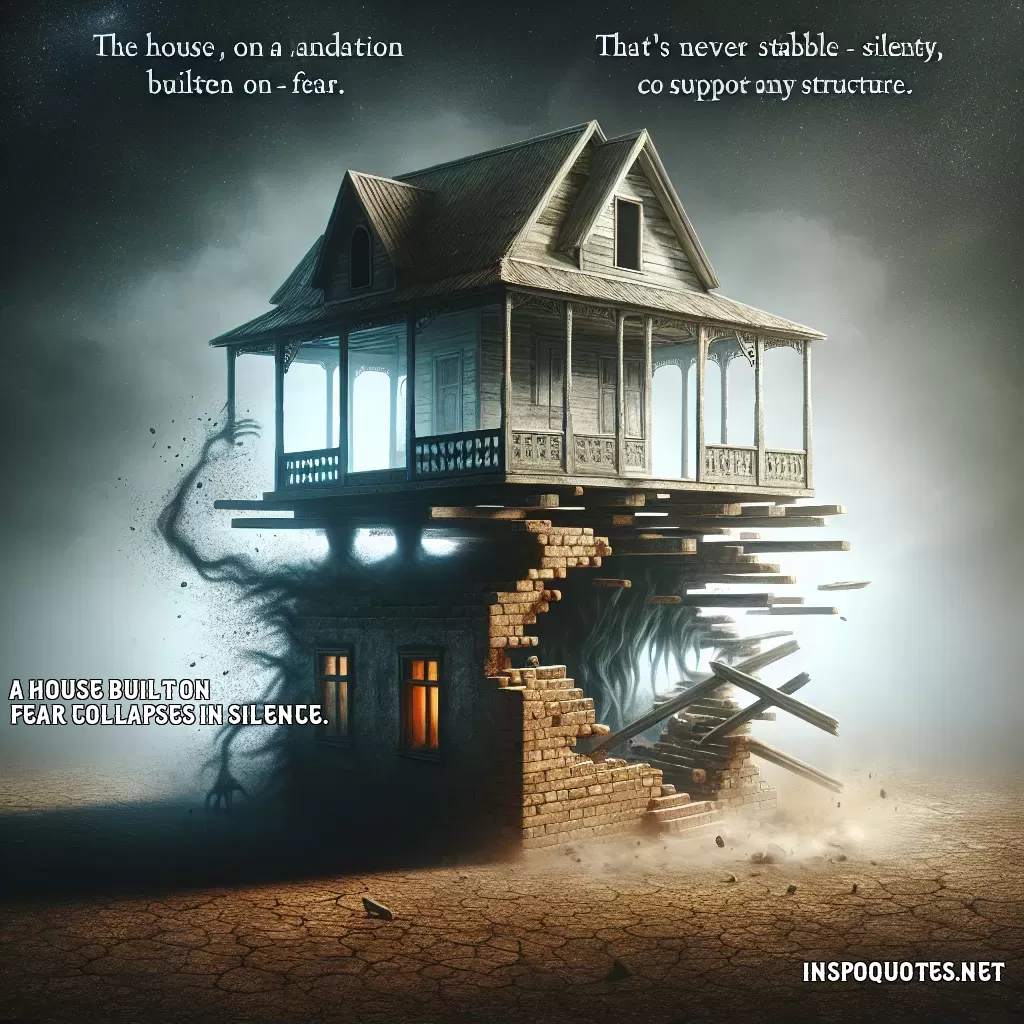
A house built on fear collapses in silence.
Author: Moshin Hamid
👁️ 19 views
The quote "A house built on fear collapses in silence" encapsulates the idea that any foundation constructed on fear is inherently unstable and bound for failure, often in a quiet and understated manner. Let’s break this down: A "house" in this context symbolizes any construct or system—be it a relationship, organization, or even a societal structure. When this house is "built on fear," it implies that fear is the driving force or foundation on which it stands. This fear could manifest as intimidation, control, manipulation, or insecurity. For instance, in a personal relationship, if one partner relies on fear to maintain control, the bond becomes fragile and unsustainable. Similarly, organizations that govern through fear might initially wield power, but over time, such fear erodes trust and loyalty. The latter part of the quote, "collapses in silence," suggests that the disintegration of such a structure occurs quietly and often unnoticed until it's too late. This silence can be seen as the absence of open communication or dissent, as fear stifles voices and discourages transparency. People may choose to endure silently rather than confront issues due to the dread of repercussions. Furthermore, when collapse happens in silence, it points to a lack of external acknowledgment or support. The downfall may not provoke outcry or immediate attention because the initial fear that held the structure together also kept observers at bay, creating an isolated implosion. Ultimately, the quote warns against using fear as a foundational tool. Instead, it highlights the critical importance of building systems, relationships, and communities on positive values such as trust, respect, and open communication, which lead to enduring resilience and sustainability.
Quote By: Moshin Hamid
Moshin Hamid is a renowned Pakistani author, best known for his insightful explorations of identity, globalization, and the complexities of modern life. Born on July 23, 1971, in Lahore, Pakistan, Hamid spent his early years in a culturally rich environment that profoundly influenced his writing. He later moved to the United States, where he attended Harvard University, earning a degree in economics. This blend of Eastern and Western experiences has informed much of Hamid's literary work.
Hamid gained international recognition with his novel "The Reluctant Fundamentalist," published in 2007. The book is a compelling narrative that delves into the life of a young Pakistani man living in America in the wake of the September 11 attacks. Through the protagonist's transformation, Hamid examines themes of identity, alienation, and the impact of global events on personal lives. The novel received critical acclaim and was shortlisted for the Booker Prize, solidifying Hamid's status as a significant voice in contemporary literature.
Following the success of his debut, Moshin Hamid published several other works, including "How to Get Filthy Rich in Rising Asia" (2013), which cleverly uses a self-help book format to tell the story of a young man navigating the challenges of economic growth in an unnamed Asian city. This work showcases Hamid's unique narrative style, blending humor and critique in a manner that captivates readers while prompting them to reflect on serious social issues. His 2017 novel, "Exit West," further cements Hamid's place in modern literature, exploring the themes of migration and displacement through a fantastical lens of magical doors that lead to different parts of the world.
Moshin Hamid's literature often transcends cultural boundaries, offering profound insights into the human experience. His ability to weave social commentary into engaging narratives not only earns him acclaim but also encourages dialogue on pressing global issues. Today, he continues to be an influential figure in contemporary literature, inspiring readers with his thought-provoking works that challenge perceptions of belonging and identity in an increasingly interconnected world.